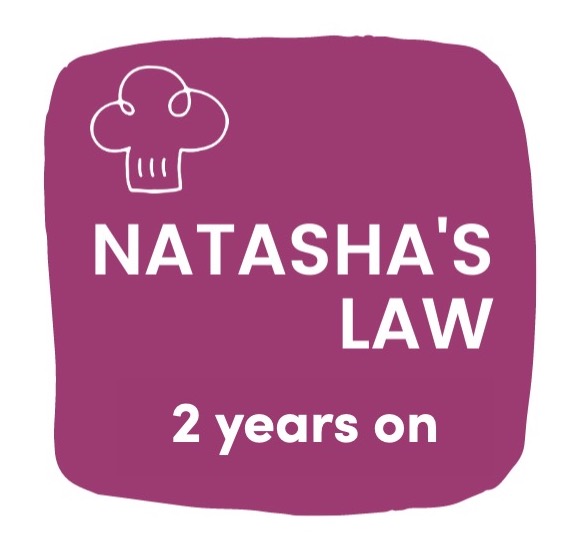Natasha’s Law – 2 years on
- Published 15th Sep 21
- Categories Blog

In 2021, the Government introduced a new law regarding allergens and food labelling, after a campaign for the expansion of legislation to bring the labelling requirements of PPDS foods more in line with pre-packed foods. The campaign was led by the parents of Natasha Ednan-Laperouse who died in 2016, from an allergic reaction to a baguette which was Pre-packed for Direct Sale (PPDS). Under this new legislation, often known as ‘Natasha’s Law’, it has been a legal requirement since 1 October 2021 for PPDS food labels to clearly display the name of the food and a full ingredients list, with the 14 regulated allergens emphasised.
Food allergies are a cause of particular concern in young children, where the incidence of food allergy (often life threatening) is estimated to be greater in toddlers (5-8%) than in adults (1-2%) (Pawankar R, et al, 2013)
At the second anniversary of the law’s introduction, we asked our CMC Allergen Expert, Kirstie Clyde, how the law had been received and what effects it appears to have had.
While food business operators (FBO’s) and their staff should now be fully aware and familiar with the changes introduced in October 2021, when it comes to dealing with allergens there is no room for complacency. Simply familiarising oneself with the law will not be enough to ensure compliance.
The new legislation has helped to define how businesses produce PPDS foods, but was it all crystal clear? There was some confusion at the start as to what, when and how these foods should be labelled.
What is the definition of packaging?
When is the food placed into packaging?
Whether how accessible an item of food is to consumers matters?
Which foods meet the definition of PPDS?
Where does packaging need to take place for an item to count as PPDS?
Which premises constitute part of the same food business?
The Food Standards Agency stated in a survey report this year that FBOs had generally reported that they found compliance with PPDS labelling requirements easy (81%)*.
Of the FBOs who indicated in the survey that they continued to find compliance difficult, the two most frequently cited reasons were the time taken to introduce and update labelling (46%) and the cost of doing so (38%).
The Department for Environment, Food and Rural Affairs (Defra) and The Food Standards Agency (FSA) have provided local authorities with £1.5 million in grant funding, reflecting the additional workload associated with ensuring businesses are complying with the new requirements
From the same FSA survey report it was noted that:
Compliance checks for PPDS were often conducted as part of routine food safety inspections, some LAs will also conduct reactive PPDS inspections (e.g. in response to complaints from consumers) and some will conduct visits specifically focused on PPDS foods.
In the first year since the introduction of these legal requirements, nearly all LAs had encountered at least some cases of non-compliance. Close to nine in ten LAs had observed there being no labels on the packaging of PPDS foods, and more than four fifths had observed no ingredients lists or incomplete ingredients lists.
Some LAs reported escalating incidents of non-compliance and taking enforcement action; written warnings had been issued by 40% of LAs, improvement notices had been issued by 8% and cautions had been issued by 2%.
Allergen Compliance in CMC Client Schools
Almost two years on from the implementation of Natasha’s Law, CMC remain committed to reinforcing the importance of being allergen aware in the schools and academies we support.
When Natasha’s Law was announced, we ran an 8 month campaign up to its introduction, to ensure that all our schools’ catering teams would be trained and equipped with the necessary documents and labelling system to ensure compliance. CMC have worked with LabelLogic Live in our schools for the past two years, after researching the labelling systems available on the market. The general consensus from our schools is that the system works extremely well, is easy to use and sets the Catering Manager’s mind at rest that it is always up to date.
CMC schools have all had very positive EHO reports and in general they have been impressed with our Allergen Management system and Food Allergen Guidelines. We believe that ensuring everyone in your school is allergen aware and understands how the law works is a fundamental step in ensuring your compliance with the latest requirements and the safety of your pupils, staff and customers alike.
If you require any support or advice with Allergen management or other Food Safety issues, contact us on enquiries@cmcschoolfood.co.uk
https://www.food.gov.uk/research/executive-summary-ppds-evaluation
REMEMBER, NATASHA’S LAW IS A LEGAL REQUIREMENT AND NOT SOMETHING THAT CAN BE OPTED OUT OF
Frequently asked questions about PPDS labelling…
Do the PPDS changes affect school meals that are plated to order?
No. If you are plating food (not pre-packed before the point that it is ordered) there is no need to list ingredients. You must be able to provide information, via an Allergen Day Matrix form, on the presence of any allergens in the food you are serving.
Do the PPDS changes affect packed lunches?
PPDS allergen labelling changes only affect food that is packed and sold or offered at your site.
If the lunches are packed to order, these are not pre-packed, and are therefore not PPDS. If, however, the school lunches are packed without specific orders from individual children, then these would need to comply with the new PPDS labelling requirements.
Do the PPDS changes affect school meals ordered by parents on a menu cycle?
This would not be considered PPDS if the food has been ordered before being packaged for the individual. You should continue to make allergen information available to parents and students as you do now.
However, if parents are paying for food in advance and have not made specific orders, the food could be considered PPDS depending on if and how it is packaged before being chosen by a student.
Do the PPDS changes affect school meals ordered by parents on a menu cycle?
This would not be considered PPDS if the food has been ordered before being packaged for the individual. You should continue to make allergen information available to parents and students as you do now.
However, if parents are paying for food in advance and have not made specific orders, the food could be considered PPDS depending on if and how it is packaged before being chosen by a student.
Do the PPDS changes affect pre-packed tuck that is provided to younger years pupils by the school?
Yes, the changes to PPDS labelling mean that any food that is packed on the same site before being ordered by the consumer will need to provide PPDS labelling.
This includes items wrapped in clingfilm, folded over bags and plastic bags with knots in them.
Do I need to label food wrapped in cling film?
If the food is completely or partially enclosed by cling film or other packaging before it is ordered (and is ready for presentation to the consumer), and the food cannot be altered without opening or changing the packaging, then yes it is PPDS food.
If an item is removed from cling film before it is presented to the consumer then this is not PPDS food. This is non pre-packed food and so an Allergen Daily Matrix must be provided.
Do I need to label food items if they are sold loose?
Loose food which is not sold in packaging does not require a label. It must meet current allergen information requirements for non pre-packed food – ie; an Allergen Daily Matrix form.
Do I need to label food if I prepare and wrap food and keep it under a hot lamp before it is ordered?
Yes, if you pre-pack food in anticipation of consumer orders, these products will require PPDS labelling.
Do I need to provide labels for a salad bar or self-service buffet?
If the salad is individually packaged before being ordered, it would require a PPDS food label. However, if the salad bar is self-service, and the student plates it onto a plate or into a box themselves this is non pre-packed food.
Allergen information for non pre-packed food on buffets and salad bars must have an Allergen Daily Matrix form.
If I display allergen information on a menu or on our website to inform parents, do I still need to label PPDS food?
Yes, using an allergen information sheet is not a substitute for PPDS food labelling. PPDS food will still require a full ingredients list and allergen information on the label.
Do hot drinks, such as tea or coffee, require PPDS labelling?
Hot drinks made to order are not PPDS and do not require PPDS labelling.
But if you pour and lid drinks before consumers order them, in anticipation of a rush, the drinks would be PPDS and would need labelling.
Need help with your allergen compliance?
CMC can give you advice and support on all aspects of your food safety in school.
Contact us today to see how we can help you.
01254 351887
enquiries@cmcschoolfood.co.uk

